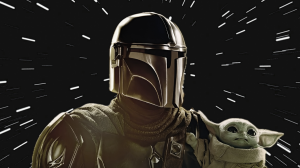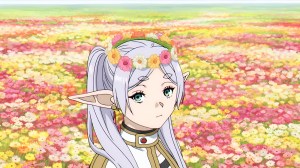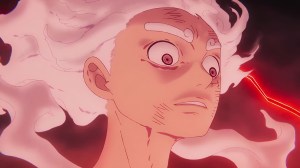My first taste of Star Trek came as a toddler, after Star Trek: The Next Generation premiered. I didn’t have much connection to the show, but I recognized the familiar faces from watching with my family, enough to get excited for a Star Trek movie coming to theaters in 1991. Star Trek VI: The Undiscovered Country, the final entry with the original Star Trek cast, was the result, leaving young me scratching my head. I now know The Undiscovered Country is one of the better additions to the series. At the time, however, I was too young to grasp the plot full of political intrigue and murder. All I saw was weird-looking Worf guys being shot, bubblegum coming out of their bodies, and a shapeshifting woman helping three old men in the snow. Safe to say, it was not for me at the time.
Videos by ComicBook.com
What instantly grabbed me at just the right time, and seemed created specifically for me, was the original Star Wars trilogy. A THX-remastered box set of the original movies was released in 1995, and I wore the tapes out. My favorite was Return of the Jedi, which marked my age at the time, but also delivered everything I’d be instantly hooked by in the movie. I loved the starships, the weapons, the aliens, and the characters bringing them all together.
Star Wars had space battles with fighters, Han Solo as the rugged bandit with a heart of gold, and young Luke Skywalker, who steps out of his life in the desert to become the most important person in the galaxy. And none of this touches on how cool the villains were, especially “Dark” Vader, which is what I thought was his name the first time I watched.
Comparisons between franchises always felt silly, especially when the main thing they share is the word “Star” in the title. But fans drew lines, took sides, and turned a friendly debate into a weird competition that ended up being a detriment to the Star Trek franchise in the years after The Undiscovered Country. I loved Star Wars, and that was the camp I called home, even if I’d still check in on Trek from time to time.
Why Did Star Trek Gain Ground?

I was firmly in the Star Wars camp up through the release of Attack of the Clones. By the time Revenge of the Sith was released, my age started to show, and my interest was waning. There was a lot more competition for my attention. Grand Theft Auto 3 had been released! Things grow! Maturity rears its ugly head.
While I still enjoy Star Wars today, the need for depth brought me back to the Star Trek franchise. Aided by J.J. Abrams’ Star Trek reboot and the influences drawn from Star Wars, I received a proper introduction to those original characters. From there, fans would become familiar with the “good” Star Trek movies like Wrath of Khan and start making whispers about what could come next. Deep Space Nine would bring the first “war” to the franchise with the Dominion conflict, while First Contact was a perfect introduction to The Next Generation crew on the big screen if you ignored Generations.
It doesn’t take long for all of this to open up my mind to boldly going back to check out what made older audiences fall in love. While Star Wars was steeped in the fantasy elements applied to space, the original Star Trek series cherished the influence by utlizing the actual science of space. It wasn’t “Far, Far Away,” or a nightmare, instead acting as a glimpse into a future where Utopia had taken hold and we ventured to space as a result. But it doesn’t stop there while I’m watching the original series, I begin to see other aspects flutter and show themselves outside of the confines of the Enterprise.
It hit me that Star Trek was a playground for science fiction writers and creative people to play. Harlan Ellison, David Gerrold and Jerome Bixby were just a few of the names delivering stories that went beyond “good guy shoot bad guy.” While the framing was always centered on the crew of the Enterprise and their experiences exploring the galaxy, concepts were introduced that nobody in Star Wars was talking about. Themes like race, colonialism, and warfare are presented in ways that a person could relate to and understand, with the Enterprise acting as the petri dish housing this experiment.
The Difference to Me, The Difference to You

Your mileage may vary when it comes to differences that matter between Star Wars and Star Trek. The clearest example is how Star Wars is a take on the classical hero’s journey with some dark detours. It also distinctly sets the tale in a galaxy far from our own. It came with a story that most could identify with, though it didn’t bother to dig much deeper than good vs bad. And that was all it needed until the Disney era gave other creatives a chance with the franchise.
Star Trek always dealt with concepts that made you think, scratched itches you didn’t expect when it comes to science and technology, and felt like the future. Yes, you were only cruising around a small quadrant of the Milky Way, but it felt lived in; it felt like it had history before humanity made first contact. Star Wars never really touched on the past outside of some of the Extended Universe novels and comics. The prequels shed some light, but not enough. For the longest time, the Empire was the bad side, the Rebel Alliance was good, and they remained that way. It was all you needed to know.
The best example to me is Death Star’s destruction of Alderaan in the original Star Wars. It’s a despicable and evil act no matter how you look at it, but the shock of the moment and the weight for Princess Leia facing Vader and Grand Moff Tarkin doesn’t dig much deeper despite her just watching her home planet explode.
If the same were featured in a Star Trek project, there would be discussions over the why the planet would be destroyed, including a look at the sentient life on the surface, and there would be questions about whether any interference was warranted or if it went against the Prime Directive. Diplomacy and creativity would be the first option, hoping to out think their problems instead of the faster-paced action you’d see in Star Wars. Nobody is flying out of the core of a battle station in Star Trek, at least not in the older series.
You Got Star Wars in My Star Trek

William Shatner has long said Star Wars launched Star Trek. Before its release, all fans had were the original series episodes and the animated series that followed. The series was effectively canceled and left in limbo. It wasn’t until Star Wars was released in 1977, that was when things really opened up.
“First of all, Star Wars created Star Trek. You know that?” the former Star Trek captain told a convention crowd in 2016. “At Paramount Studios they were running around bumping into each other: ‘What do we got?! What do we got to equal Star Wars? This is a big thing!
“There was this thing that we canceled, under another management, it was called Star … Trek? Let’s resurrect that!” he added.
The influences don’t end there. It’s doubtful we’d have gotten a series like Andor without the Star Trek influence. The themes were always present in Star Wars, but they didn’t get any attention. Star Trek made those themes present in the mission and played around with different viewpoints, which is a luxury of television. It’s also hard to deny that the cinematic quality of Star Wars injected some energy into Star Trek. While the original Star Trek: The Motion Picture was a landmark for special effects, it was also kinda boring. That’s when Wrath of Khan came, and the mini trilogy that would follow borrowed a lot of the humanity from the characters in Star Trek.
“Bones” McCoy might be a doctor in the Star Trek franchise, but his biting tongue made him just as much of a charismatic force as Star Wars scoundrels like Han Solo or Lando Calrissian. They have wit and tricks up their sleeves, whether it is smuggling in Solo’s case or treating patients with future medicine in Star Trek IV: The Voyage Home.
So, Where Do Both Stand Now?

Looking back, both franchises offer a lot to someone throughout their life. My enjoyment of Star Trek grew over time and plenty of other people have the same story. It could just be as simple as growing older. It is the more “mature” of the two franchises, sure, but I think it just reflects on where life has taken me.
It doesn’t mean one is better than the other. I feel it’s more of a sign that some media and stories just offer different things to audiences. I could toss in my copy of Star Wars or catch it on TV, and I’d be hooked to watch the whole thing. The same can happen when a good episode of Star Trek: The Next Generation is on, or one of the classic movies. The only real problem is how this doesn’t seem to translate to interest in watching any of the newest offerings. Andor is special, Brave New Worlds is special, but there is a lot more competition in the world.
If anything, I feel they can borrow a lot more from each other. Andor‘s heist on Aldhani could also have acted as the perfect Star Trek adventure, debating the Prime Directive and showcasing what makes those locals unique.
And in the converse, Star Trek Into Darkness is essentially a Star Wars movie. The U.S.S. Vengeance puts warfare ahead of science and discovery, giving us what the chase with the First Order could’ve been in The Last Jedi.
There are other examples, but the bottom line is that Star Wars truly did make Star Trek. And I can reap those benefits as a fan today, without the tribalism. In the end, that’s a concept both franchises execute very well.









